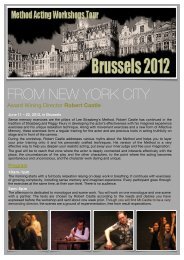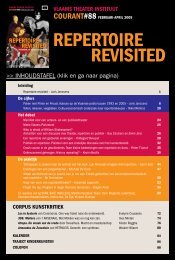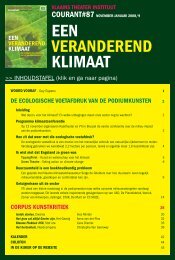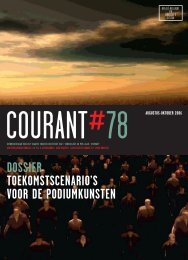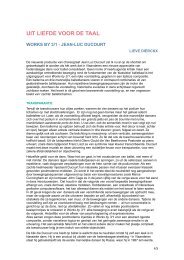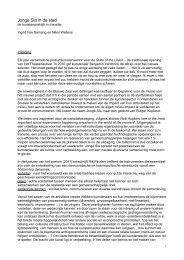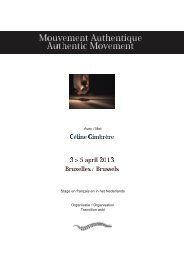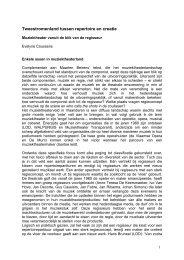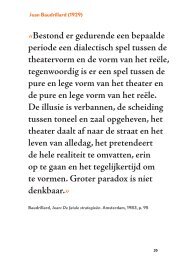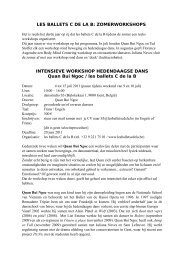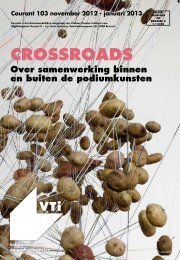music theatre in flanders - Muziekcentrum Vlaanderen
music theatre in flanders - Muziekcentrum Vlaanderen
music theatre in flanders - Muziekcentrum Vlaanderen
You also want an ePaper? Increase the reach of your titles
YUMPU automatically turns print PDFs into web optimized ePapers that Google loves.
credits organisations<br />
%<br />
credits<br />
%<br />
organisations<br />
‘93-’97 foreign 63 45 16% 36%<br />
other public fund<strong>in</strong>g 132 18 33% 14%<br />
Perform<strong>in</strong>g Arts Decree 175 43 44% 34%<br />
non-subsidized 30 19 8% 15%<br />
‘97-’01 foreign 145 77 21% 37%<br />
other public fund<strong>in</strong>g 204 35 30% 17%<br />
Perform<strong>in</strong>g Arts Decree 265 61 39% 29%<br />
non-subsidized 67 34 10% 16%<br />
‘01-’05 foreign 318 169 28% 44%<br />
other public fund<strong>in</strong>g 229 50 20% 13%<br />
Perform<strong>in</strong>g Arts Decree 459 95 41% 25%<br />
non-subsidized 115 67 10% 18%<br />
The ris<strong>in</strong>g number of production credits is apparent <strong>in</strong> all categories.<br />
The trend l<strong>in</strong>es, however, are most outspoken for foreign<br />
organizations and the Perform<strong>in</strong>g Arts Decree companies.<br />
• The number of foreign credits rises from 63 <strong>in</strong> 1993-1997 to<br />
318 <strong>in</strong> 2001-2005: <strong>in</strong> absolute figures, this is an <strong>in</strong>crease from<br />
16% to 28% of the total number of credits. The values are higher<br />
than <strong>in</strong> the perform<strong>in</strong>g arts <strong>in</strong> general (where the rise goes<br />
from 11 to 19%) and lower than <strong>in</strong> dance (where it goes from 27<br />
to 33%).<br />
• Another strik<strong>in</strong>g feature is the <strong>in</strong>creas<strong>in</strong>g participation by Perform<strong>in</strong>g<br />
Arts Decree-funded organizations. In relative terms,<br />
the Perform<strong>in</strong>g Arts Decree’s share <strong>in</strong> the total number rema<strong>in</strong>s<br />
more or less stable. In absolute figures, however, the<br />
number of credits by Perform<strong>in</strong>g Arts Decree-funded organizations<br />
rises from 175 to 459.<br />
In short, <strong>in</strong>ternationalization and an <strong>in</strong>creas<strong>in</strong>g production capacity<br />
stimulated by the Perform<strong>in</strong>g Arts Decree appear to be important<br />
factors expla<strong>in</strong><strong>in</strong>g the ris<strong>in</strong>g number of productions <strong>in</strong> the<br />
<strong>music</strong> <strong>theatre</strong> segment. In the follow<strong>in</strong>g two chapters, we shall<br />
exam<strong>in</strong>e these categories more closely.<br />
But let us have a look at the backgrounds of the foreign organizations<br />
first. Next, we shall take a close look at the Perform<strong>in</strong>g<br />
Arts Decree category and at the contribution by the various<br />
decree sub-categories to <strong>music</strong> <strong>theatre</strong> production.<br />
A ClOSer lOOk AbrOAd<br />
For the entire period 1993-2005 we count a total of 215 foreign<br />
producers mak<strong>in</strong>g a contribution to Flemish <strong>music</strong> <strong>theatre</strong>. For<br />
the ma<strong>in</strong> part, these contributions are co-production support, but<br />
the participation of prom<strong>in</strong>ent co-producers such as the Kunstenfestivaldesarts,<br />
deS<strong>in</strong>gel or Vooruit makes the <strong>in</strong>ternational<br />
exchange not only a matter of tak<strong>in</strong>g, but also of giv<strong>in</strong>g. These<br />
Flemish organisations frequently co-produce foreign <strong>music</strong> <strong>theatre</strong><br />
companies.<br />
In <strong>music</strong> <strong>theatre</strong>, the <strong>in</strong>ternational dimension is developed<br />
somewhat more strongly than <strong>in</strong> the perform<strong>in</strong>g arts <strong>in</strong> general.<br />
Maybe it is the <strong>music</strong>al element that causes <strong>music</strong> <strong>theatre</strong> production<br />
to be less conf<strong>in</strong>ed to national or l<strong>in</strong>guistic borders than<br />
text-based work. Economic elements may also play an important<br />
part: it is precisely <strong>in</strong> the <strong>music</strong> <strong>theatre</strong> segment that partnerships<br />
are the most numerous. Jo<strong>in</strong><strong>in</strong>g forces makes major productions<br />
possible, allow<strong>in</strong>g live on stage <strong>music</strong> performance. We should,<br />
however, be cautious to generalize the <strong>in</strong>ternational potential of<br />
28 29<br />
table of contents




